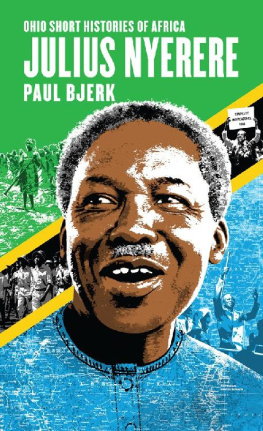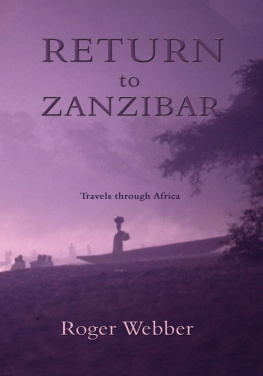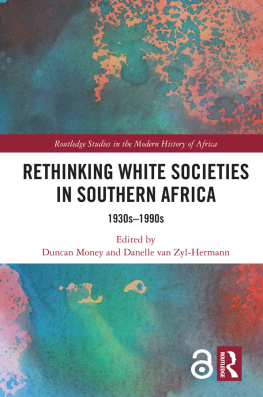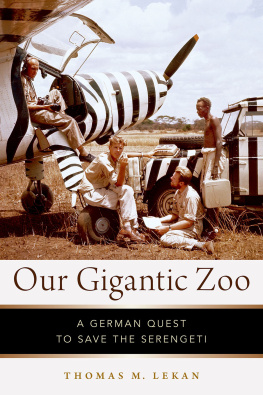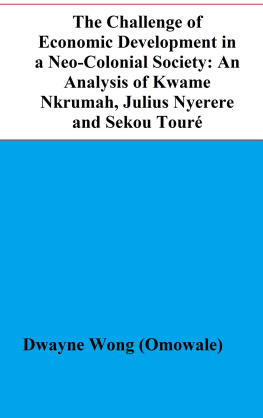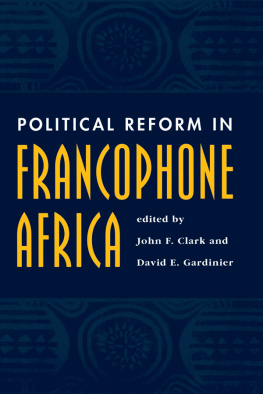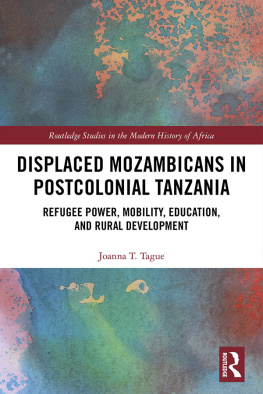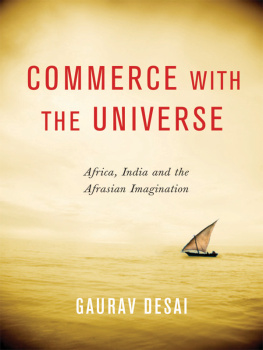Julius Nyerere
OHIO SHORT HISTORIES OF AFRICA
This series of Ohio Short Histories of Africa is meant for those who are looking for a brief but lively introduction to a wide range of topics in African history, politics, and biography, written by some of the leading experts in their fields.
Steve Biko
by Lindy Wilson
Spear of the Nation (Umkhonto weSizwe): South Africas Liberation Army, 1960s1990s
by Janet Cherry
Epidemics: The Story of South Africas Five Most Lethal Human Diseases
by Howard Phillips
South Africas Struggle for Human Rights
by Saul Dubow
San Rock Art
by J.D. Lewis-Williams
Ingrid Jonker: Poet under Apartheid
by Louise Viljoen
The ANC Youth League
by Clive Glaser
Govan Mbeki
by Colin Bundy
The Idea of the ANC
by Anthony Butler
Emperor Haile Selassie
by Bereket Habte Selassie
Thomas Sankara: An African Revolutionary
by Ernest Harsch
Patrice Lumumba
by Georges Nzongola-Ntalaja
Short-changed? South Africa since Apartheid
by Colin Bundy
The ANC Womens League: Sex, Gender and Politics
by Shireen Hassim
The Soweto Uprising
by Noor Nieftagodien
Frantz Fanon: Toward a Revolutionary Humanism
by Christopher J. Lee
Ellen Johnson Sirleaf
by Pamela Scully
Ken Saro-Wiwa
by Roy Doron and Toyin Falola
South Sudan: A New History for a New Nation
by Douglas H. Johnson
Julius Nyerere
by Paul Bjerk
Thabo Mbeki
by Adekeye Adebajo
Julius Nyerere
Paul Bjerk
OHIO UNIVERSITY PRESS
ATHENS
Ohio University Press, Athens, Ohio 45701
ohioswallow.com
2017 by Ohio University Press
All rights reserved
To obtain permission to quote, reprint, or otherwise reproduce or distribute material from Ohio University Press publications, please contact our rights and permissions department at (740) 593-1154 or (740) 593-4536 (fax).
Printed in the United States of America
Ohio University Press books are printed on acid-free paper 
27 26 25 24 23 22 21 20 19 18 17 5 4 3 2 1
Cover design by Joey Hi-Fi
Library of Congress Cataloging-in-Publication Data
Names: Bjerk, Paul, author.
Title: Julius Nyerere / Paul Bjerk.
Other titles: Ohio short histories of Africa.
Description: Athens, Ohio : Ohio University Press, 2017. | Series: Ohio short histories of Africa | Includes bibliographical references and index.
Identifiers: LCCN 2017004209| ISBN 9780821422601 (pb : alk. paper) | ISBN 9780821445969 (pdf)
Subjects: LCSH: Nyerere, Julius K., 19221999. | PresidentsTanzaniaBiography. | Nation-buildingTanzania. | TanzaniaHistory20th century. | TanzaniaPolitics and government20th century.
Classification: LCC DT448.25.N9 B542 2017 | DDC 967.8041092dc23
LC record available at https://lccn.loc.gov/2017004209
Contents
Illustrations
Figures
Map
Mwalimu Nyerere
A Study in Leadership
In January 2006 a delegation from the Vatican held a mass in the Tanzanian village of Butiama to begin investigating the life of Julius Kambarage Nyerere for beatification. This is usually the first step toward sainthood. But it is an unusual honor for a socialist dictator.
Neither saint nor tyrant, Nyerere was a politician who kept his integrity and vision in a harsh and changing world. He taught high school upon graduating from college in 1943, and for the rest of his life he was happiest to be called Mwalimu , the Swahili word for teacher. He became the first prime minister of independent Tanganyika in 1961, its first president in 1962, and brokered a merger with Zanzibar to become Tanzania in 1964. Prior to the presidency he headed a mass movement that skillfully brought Tanganyika to independence without violence. He was an advocate for democracy, but by reasoning that each country built its own style of democracy, he built a one-party state that regularly violated democratic values.
Nyerere pursued ambitious and not always successful policies aimed at building a peaceful and prosperous nation out of an ethnically diverse colonial territory populated mostly by illiterate peasant farmers. His Arusha Declaration in 1967 envisioned a clean government dedicated to economic growth on the basis of his theory of African socialism, or Ujamaa . Although his government gave military support to movements fighting white-minority governments, only the war with Idi Amins Uganda in 1978 mobilized the Tanzanian army and population at large. From his retirement in 1985 to his death in 1999, he used his prestige to urge for ethical political choices at home and abroad. Everyone who met him regarded him as a brilliant intellectual, but some of his policies seem disastrously misguided to us today.
As we are apt to do with historical figures, we lay claim to Julius Nyerere as a symbol of our aspirations and our nightmares; of our heroes and our villains. Yet a full-length, researched biography has not yet been written. In this sketch of his life, I seek to claim him instead as a symbol of leadership and its perils. There will be much debate before a scholarly, let alone popular, consensus is formed around these events. My hope is that this portrait can serve as a case study of an African country confronting the challenges of independence, as seen through the life of one of the eras most creative and thoughtful politicians.
Nyerere laid out an intellectual and political project and then took deliberate steps to organize people in pursuit of that project. He saw decolonization as an
His life and leadership encompassed the contradictions of his age, and those contradictions beguile us long after his death. While the Vatican may eventually find its own grounds for honoring Nyerere, such veneration is highly politicized and robs history of its human reality, where lessons might be learned from both success and failure. With a stubborn streak that easily blocked common sense, he was far from perfect. But by the same token, those who count Nyerere as a villain pursuing a systematic campaign to deny [Muslims] basic rights, as Aboud Jumbe resentfully put it, only set him up as a scapegoat for more complex social trends.
Few leaders so assiduously cultivated an inclusive political establishment or so vehemently denounced the prejudices of their own societies. Nyerere made sure his government and his closest associates reflected a cross-section of Tanzanias diverse societyMuslim, Christian, Hindu, and animist; African, Indian, Arab, and Europeaninclusive of all the countless ethnic groups of its broad territory. While those who suffered from his economic policies and political repression may cast him in the role of a Third World strongman, any honest account must also acknowledge his humility, his restraint, and his real commitment to a better life for the people of his country.

Figure 1.1 The independence cabinet, 1961. Rear, from left : Minister of Local Government Job Lusinde; Minister without Portfolio Rashidi Kawawa; Minister of Commerce and Industry Nsilo Swai; Minister of Education Oscar Kambona; Minister of Lands, Forests, and Wildlife Tewa Saidi Tewa; Cabinet Secretary Charles Meek. Front, from left : Minister of Agriculture Paul Bomani; Minister of Legal Affairs Abdallah Fundikira; Prime Minister Julius Nyerere; Minister of Finance Ernest Vasey; Minister of Communications, Power, and Works Amir Jamal. Not pictured : Minister of Home Affairs George Kahama and Minister of Health and Labour Derek Bryceson. Tanzania Information Services/MAELEZO.
Next page
